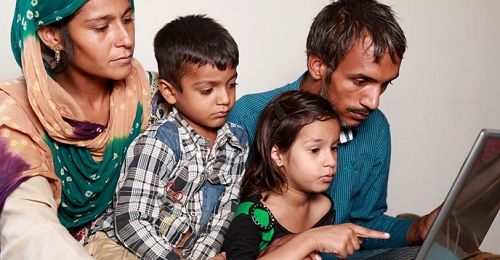NGOs from Bangladesh and Germany to receive UNESCO King Hamad Bin Isa Al-Khalifa Prize for Innovation in Education
The 2016 UNESCO King Hamad Bin Isa Al-Khalifa Prize recognizing two outstanding projects that make innovative use of Information and Communication Technologies (ICTs) in education for the benefit of disadvantaged groups will be awarded on 21 February to the Online School Project, operated by Jaago Foundation in rural Bangladesh, and to Harnessing the Power of ICTs in Higher Education, run by the German NGO Kiron that serves displaced persons.

Irina Bokova, the Director-General of UNESCO, will present each winner with a Prize certificate and USD 25,000 in a ceremony at UNESCO Headquarters, held under the patronage of His Majesty King Hamad Bin Isa Al-Khalifa of the Kingdom of Bahrain.
The theme for this year’s Prize recognizes the urgent need to respond to major obstacles that lie in the path of the most vulnerable populations with regard to equitable and inclusive access to quality education and lifelong learning.
Jaago Foundation reaches underprivileged children in rural areas of Bangladesh through the Online School programme that provides learners with high-quality courses through interactive video-conferencing. Instruction, covering English, Bengali, and mathematics, as well as natural and social sciences, is delivered by highly trained teachers based in the capital. With 1,061 annual beneficiaries, Jaago Foundation aims to help bridge the educational quality gap between urban and rural students in Bangladesh.
Kiron, a German-based NGO, is committed to ensuring equitable access to quality education for refugees, asylum seekers and internally displaced people. It carries out this work through its Massive Open Online Courses (MOOCs) project.
Kiron’s 500 MOOCs are provided free of charge and can be accessed anywhere, even in periods of crisis and at all stages of displacement and resettlement. The MOOCs come from various sources including 23 universities and cover four subjects: business and economics, engineering, computer science and social science. Through its wide networks, Kiron advocated the MOOCs among refugees and 4,000 people have benefitted from them date. Kiron also provides each student with individual tuition during the learning itinerary.
Both projects have set good examples of how to harness the full potential of ICT in education worldwide, bypassing constraints, across countries, continents and cultures, in line with the Education 2030 Agenda: strengthening access, equity, inclusion, quality and learning outcomes in education.
Source: United Nations Educational Scientific and Cultural Organization
- 570 reads
Human Rights
Ringing FOWPAL’s Peace Bell for the World:Nobel Peace Prize Laureates’ Visions and Actions

Protecting the World’s Cultural Diversity for a Sustainable Future

The Peace Bell Resonates at the 27th Eurasian Economic Summit

Declaration of World Day of the Power of Hope Endorsed by People in 158 Nations

Puppet Show I International Friendship Day 2020

